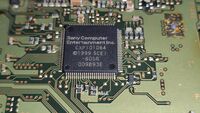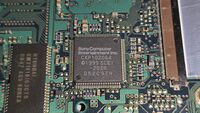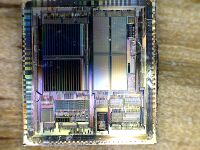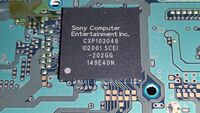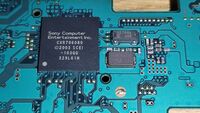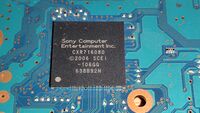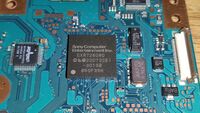MechaCon
MechaCon is short for Mechanics Controller. Its main function is to control the drive mechanism. However, this chip also handles security in the PlayStation 2 and implements game disc security, Magic Gate and KELF file decryption.
There are two known main variants of it.
The earlier one is based on the 16-bit SPC970 CPU core and was used on earlier boards up to GH-022. Chip name starts with "CXP10". GH-014 and earlier motherboards including GH-016 board come with a 100-pin QFP package. GH-017 up to GH-022 motherboards including GH-015 board come with a 136-ball BGA package.
The newer one is ARM-based (Sony SR11 core, 32-bit, ARM7TDMI), codenamed "Dragon", and used from GH-023 onwards. Chip name starts with "CXR7". Comes in a 164-ball BGA package.
The "Dragon" variant also fulfills the functions that were undertaken by the separate SysCon chip on earlier boards up to GH-022, as well as the RTC+EEPROM chip, which was separate on earlier boards (or dedicated EEPROM and RTC chips on even earlier boards).
Both have access to a 1 KB / 512 words EEPROM. The EEPROM content is different between the SPC970-based MechaCon and Dragon.
For the SPC970 MechaCon, the EEPROM is an external chip; either a dedicated EEPROM chip on early GH-015 and earlier boards including GH-016 board, or a combined Rohm RTC+EEPROM chip on late GH-015 up to GH-022 boards except GH-016 board.
Dragon has the die of the combined Rohm RTC+EEPROM chip inside its own chip package, however, the EEPROM pins are exposed on the package, and the connection between Dragon and the RTC+EEPROM is done externally on the motherboard.
Every MechaCon has a 3.5 V TTL UART interface exposed on test pads that was used by service centers for example to readjust the drive and write calibration data etc. Today it can be used with tools like PMAP (currently only supports consoles with SPC970 MechaCon, support for Dragon is highly experimental) to readjust the drive mechanism after fitting a replacement laser assembly etc. See Test points/MechaCon UART.
Additionaly, at least the SPC970-based MechaCon (both, QFP and BGA revisions) provides an I²C interface with SDA and SCL being exposed on test pads next to the MechaCon.
SPC970
Hardware revisions
- CXP101064 (only used on early A-chassis/GH-001 boards)
- CXP102064 (used from later A-chassis to D/D'-chassis boards)
- CXP103049 (BGA case, used in F and G-chassis)
Firmware revisions
Firmware comes in an OTP or mask ROM inside MechaCon. The major version number for SPC970 MechaCon firmware is always <= 3. PS3 emulated mechacon reports itself as 3.09 version. As of 2024, the SPC970 mechacon's firmware has not yet been dumped, unlike Dragon's firmware.
Unlike the later Dragon-MechaCons, which retrieve region parameters from EEPROM and have identical firmware across all regions, the SPC970-MechaCons have region-dependent firmware builds, hence many different chip labels exist for each firmware.
Unlike the later Dragon-MechaCons, the firmware (code) can not be patched/updated via patches stored in EEPROM. Instead, the "update" mentioned in official service tool for SPC970-MechaCons refers to changing some constants stored in EEPROM.
The list might be incomplete. Source
The number behind the underscore denotes the region. See below for a list of region numbers.
There is some ambiguity about which versions of CXP102064 were used in which consoles.
version_region | chip label | remarks
(cfd output) | |
---------------------|-----------------|-------------------------------------------------------------------------------------
1.02_0 (0x020100) | CXP101064-605R | A-chassis SCPH-10000 (Japan)
1.03_0 (0x030100) | CXP101064-602R | A-chassis DTL-T10000, DTL-H10000
---------------------|-----------------|-------------------------------------------------------------------------------------
unknown (0x020027) | CXP102064-651R | All Namco System 246 and 256 arcade systems
1.06_0 (0x060100) | CXP102064-001R |
1.07_0 (0x070100) | CXP102064-003R | A-chassis DTL-T10000
1.08_0 (0x080100) | CXP102064-002R | A-chassis SCPH-15000
1.09_0 (0x090100) | CXP102064-751R | A-chassis DTL-T10000H, DTL-T15000
2.00_0 (0x000200) | CXP102064-004R |
2.02_0 (0x020200) | CXP102064-005R | A+ chassis (GH-003) SCPH-18000 (Japan), AB-chassis (GH-008) SCPH-18000 (Japan)
2.04_1 (0x040201) | CXP102064-101R | B and C chassis SCPH-30001 (US)
2.04_2 (0x040202) | CXP102064-201R | C-chassis SCPH-30003/4 (UK/Europe)
2.04_3 (0x040203) | CXP102064-301R | C-chassis SCPH-30002 (AU/NZ)
2.05_0 (0x050200) | CXP102064-702R | B-chassis DTL-H30001, DTL-H30002
2.06_1 (0x060201) | CXP102064-102R | B/C/D-chassis SCPH-30001 (US)
2.06_2 (0x060202) | CXP102064-202R | C/D-chassis SCPH-30003/4 (UK/Europe)
2.06_3 (0x060203) | CXP102064-302R | C-chassis SCPH-30002 (AU/NZ)
2.07_0 (0x070200) | CXP102064-703R | B-chassis DTL-H30001, DTL-H30002
2.08_0 (0x080200) | CXP102064-006R |
2.09_0 (0x090200) | CXP102064-704R |
2.12_0 (0x0c0200) | CXP102064-007R | D-chassis (with single ROM?) SCPH-30000/SCPH-35000 (Japan)
2.12_1 (0x0c0201) | CXP102064-103R | D-chassis SCPH-30001/SCPH-35001 (US)
2.12_2 (0x0c0202) | CXP102064-203R | D-chassis SCPH-30003/4 and SCPH-35003/4 (UK/Europe)
2.12_3 (0x0c0203) | CXP102064-303R | C/D-chassis SCPH-30002/SCPH-35002 (AU/NZ)
2.13_0 (0x0d0200) | CXP102064-705R | also -752R, D-chassis DTL-H30000 (Japan), D-chassis DTL-H30101 (US), D-chassis DTL-H30102
2.13_0 (0x0d0200) | CXP102064-752R | also -705R, D-chassis DTL-H30000 (Japan), D-chassis DTL-H30101 (US)
2.14_0 (0x0e0200) | CXP102064-008R | D-chassis SCPH-30000/SCPH-35000 (Japan)
2.14_1 (0x0e0201) | CXP102064-104R | D-chassis SCPH-30001/SCPH-35001 (US)
2.14_2 (0x0e0202) | CXP102064-204R |
2.14_3 (0x0e0203) | CXP102064-304R | D-chassis SCPH-30002/SCPH-35002 (AU/NZ)
---------------------|-----------------|-------------------------------------------------------------------------------------
3.00_1 (0x000301) | CXP103049-101GG | F-chassis SCPH-30001 R (USA) with separate EEPROM and RTC
3.00_2 (0x000302) | CXP103049-201GG | F-chassis SCPH-30003/4 R (UK/Europe) with separate EEPROM and RTC
3.00_3 (0x000303) | CXP103049-301GG | F-chassis SCPH-30002 R (AU/NZ) with separate EEPROM and RTC
3.02_0 (0x020300) | CXP103049-001GG | F-chassis SCPH-30000 (Japan) with combined EEPROM+RTC
3.02_1 (0x020301) | CXP103049-102GG | F-chassis SCPH-30001 R (USA) with combined EEPROM+RTC
3.02_2 (0x020302) | CXP103049-202GG | F-chassis SCPH-30003/4 R (UK/Europe) with combined EEPROM+RTC
3.02_3 (0x020303) | CXP103049-302GG | F-chassis SCPH-30002 R (AU/NZ) with combined EEPROM+RTC
3.04_4 (0x040304) | CXP103049-401GG | F-chassis SCPH-30005/6/7 R (Asia) with combined EEPROM+RTC
3.06_0 (0x060300) | CXP103049-002GG | G-chassis SCPH-37000/SCPH-39000 (Japan)
3.06_1 (0x060301) | CXP103049-103GG | G-chassis SCPH-39001/39010 (USA/Canada)
3.06_2 (0x060302) | CXP103049-203GG | G-chassis SCPH-39003/4 (UK/Europe)
3.06_3 (0x060303) | CXP103049-303GG | G-chassis SCPH-39002 (AU/NZ)
3.06_4 (0x060304) | CXP103049-402GG | G-chassis SCPH-39005/6/7 (Asia)
3.06_5 (0x060305) | CXP103049-501GG | G-chassis SCPH-39008 (Russia)
3.08_0 (0x080300) | CXP103049-003GG | G-chassis SCPH-39000 (Japan), late units
3.08_4 (0x080304) | CXP103049-403GG | G-chassis SCPH-39005/6/7 (Asia), late units
---------------------|-----------------|-------------------------------------------------------------------------------------
Last number represents region (more information in the table)
EEPROM layout
| Start (word) | End (word) | Size (byte) | Offset in file | Description |
|---|---|---|---|---|
| 0x000 | ????? | ???? | 0x000 | DVD-ROM Disc Detect |
| 0x010 | ????? | ???? | 0x020 | DVD-ROM Servo |
| 0x0C0 | 0x0C6 | 0x0C | 0x180 | DVD-ROM Tilt (not present on mechacon 1.xx) |
| 0x0D0 | 0x0C9 | 0x12 | 0x1A0 | Model Name (not present on mechacon 1.02, 1.03) |
| 0x0E0 | 0x0E8 | 0x10 | 0x1C0 | PS2 ID (i.Link id + Console id) |
| 0x0F0 | 0x0FD | 0x20 | 0x1E0 | DVD-ROM Tray |
| 0x100 | 0x138 | 0x70 | 0x200 | config 2 (DVD Video Player) |
| 0x140 | 0x160 | 0x40 | 0x280 | config 0 (EEGS) |
| 0x180 | 0x1B8 | 0x70 | 0x300 | config 1 (OSD (User data)) |
???? - means that area size is variable and depends on mechacon version
Model number
| Offset | Size | Description | |
|---|---|---|---|
| 0x1B0 | 0x12 | Model number string. Type char. Zero padded. | |
| Model number | 0x1A0 | 1-16 | Model name string. Max 15 or 16 characters. Zero padded. If started with "DTL-H" then OSD will block DVD player from work. |
| 0x1B0 | 1 | Null. | |
| 0x1B1 | 1 | uint8_t sum = 0xFF - sum(0x1B0:0x1BF) | |
PS2 ID
i.Link ID
| Offset | Size | Description | |
|---|---|---|---|
| 0x1C0 | 0x8 | i.Link ID | |
| Console id | 0x1C0 | 1 | 07 - Sony Company Code (SCE), fixed value. |
| 0x1C1 | 3 | Model ID. Also known as Sony Model Id. Can be calculated from Console Model ID via formula: (0x1C1-0x1C3) = (Console Model ID - 0xd200) + 0x1a0001. The only exception is SCPH-10000/SCPH-15000, it uses fixed value: 0x1A0000. | |
| 0x1E4 | 4 | i.Link ID. Divided into Category and i.Link number, where category is some hex value based on Console Model ID and i.Link number is decimal number based on Console Serial Number. Can be calculated from Console Serial Number and Console Model ID via difficult decimal offset tables. There exist big text tables that contains information about serial ranges and applicable decimal offsets depending on console model and serial range. Full tables still unknown and not published publicly. | |
Console id
| Offset | Size | Description | |
|---|---|---|---|
| 0x1C8 | 0x8 | Console ID | |
| 0x1C8 | 2 | Console Model ID. Unique per model number, color and edition. Can be restored from the console sticker. 0xd200 - 0xd22d all known ids for pre-dragon models. Total 45 ids, currently only few of them are missing. Most likely there are no more than 45 ids (but it is still unknown). Actually, Sony used only 1 byte to represent Console Model ID, but it is easier to use 2-byte value to be in sync with Dragon models. This 1 byte value is called SCE Model Id (similar field in i.Link id area is called Sony Model Id). | |
| 0x1CA | 2 | 0x0111 - always. Known as SDMI Company ID. Actually these 2 ids by Sony are splitted differently. Not 2+2 bytes, but 1+3 bytes. So SDMI Company ID: 01-11-D2 (fixed value) and Console Model ID - 1 byte value. | |
| 0x1CC | 3 | Console Serial Number (in dec). Can be restored from the console sticker. | |
| 0x1CF | 1 | EMCS ID. Id of plant, where the console was manufactured. Can be restored from the console sticker. 0x00 - Japan (generic plant) 0x01 - FOXC (Foxconn, China) 0x02 - SZMT (SuZhou MainTek, China) 0x03 - SKZ (SONY KISARAZU, Japan). 00 - doesnt represent any plant, when there is 00 that only means that it is made in Japan but it can be any plant actually (non Foxconn). It seems that 02 and 03 EMCS ids appeared very late (at the end of 39k production). | |
Dragon
Hardware revisions
- CXR706F080 (has a flash ROM for firmware; used for engineering, not used in retail consoles)
- CXR706080 (used in H, I and J chassis SCPH-500xx/5500x consoles as well as in PSX)
- CXR716080 (used in K, L and M slim chassis SCPH-700xx, SCPH-750xx and SCPH-770xx consoles)
- CXR726080 (used in N, P and R slim chassis SCPH-790xx and SCPH-900xx consoles and in the Bravia KDL-22PX300)
Firmware revisions
Firmware comes in an OTP or mask ROM inside MechaCon, except in CXR706F080, which has a reprogrammable flash ROM. It is however possible to apply patches to it via EEPROM.
Dumps: https://mega.nz/folder/MNpAQDzJ#bZpyfb7aGrhGDMR_ZGA8ig
Some version(s) of the DSP's firmware have a tendency to crash MechaCon by sheer bad luck or on badly readable discs (e.g. badly burned/low-quality DVD-R discs or scratched original discs), overvolting the focus/tracking coils of the laser and killing them and also the driver IC in the process. While the problematic DSP has already been used since the GH-017 board/G-chassis, its SPC970-based MechaCon seems less susceptible to fully crashing for reasons not entirely known as of 2024. This leads to the issue being mostly prevalent beginning with the GH-023 board/H-chassis and thus with the ARM-based Dragon MechaCon. Several hardware-based mitigations/"fixes" have been developed by the community to address this issue with varying degrees of success. The most well known of these fixes have been the "Romeo-mod"/"LA-fix" for SCPH-500xx/5500x consoles and "summ0ne's fix" for some SCPH-700xx consoles; however, these do not reliably prevent damage and can have side effects like reading issues and a slow tray. The most reliable fix is the Matrix PIC fix which monitors communication between DSP and MechaCon and turns off the console when a crash occurs.
PSX uses MechaCon v5.10 (CXR706080-702GG) (for DESR-x000 and DESR-x100) and v5.14 (CXR706080-703GG) (for DESR-x500 and DESR-x700).
Major version number for Dragon MechaCon firmware is always >= 5.
The list might be incomplete. Source
version | chip label | remarks -----------------|-----------------|--------------------------------------------------------------------- 5.00 (0x0500) | CXR706080-101GG | 2003-01-20 15:28, very early H-chassis: GH-023 5.01 (0x0501) | CXR706080-???GG | H-chassis Debug Station (DTL-H5000x) 5.02 (0x0502) | CXR706080-102GG | 2003-03-05 22:40, early H-chassis: GH-023 5.04 (0x0504) | CXR706080-103GG | 2003-04-08 23:27, H-chassis and I-chassis: GH-023 and GH-026 5.05 (0x0505) | CXR706080-???GG | H-chassis Debug Station (DTL-H5000x) 5.06 (0x0506) | CXR706080-???GG | 2003-06-25 23:03, not confirmed 5.06mx (0x0506) | CXR706080-106GG | 2004-04-06 13:05, different from other v5.06 MechaCons, only sold in Mexico 5.08 (0x0508) | CXR706080-???GG | (Not confirmed) 5.10 (0x050a) | CXR706080-702GG | 2003-10-08 22:00, PSX v1 (DESR-x000 and DESR-x100): XPD-001 5.12 (0x050c) | CXR706080-105GG | 2003-11-20 20:05, J-chassis: GH-029; has also been found on a CXR706F080-1GG 5.14 (0x050e) | CXR706080-703GG | 2004-08-25 02:12, PSX v2 (DESR-x500 and DESR-x700): XPD-005 -----------------|-----------------|--------------------------------------------------------------------- 6.00 (0x0600) | CXR716080-101GG | 2004-06-21 09:53, very early K-chassis: GH-032, GH-035 6.02 (0x0602) | CXR716080-102GG | 2004-07-20 09:04, early K-chassis: GH-032, GH-035 6.04 (0x0604) | CXR716080-103GG | 2004-12-10 01:30, K-chassis: GH-032, GH-035 6.06 (0x0606) | CXR716080-104GG | 2005-04-27 09:17, L-chassis: GH-036, GH-037, GH-040, GH-041 6.08 (0x0608) | CXR716080-???GG | (Not confirmed) 6.10 (0x060a) | CXR716080-106GG | 2006-03-29 06:48, M-chassis: GH-051, GH-052 -----------------|-----------------|--------------------------------------------------------------------- 6.12 (0x060c) | CXR726080-301GB | 2007-01-29 03:47, all N, P, R chassis consoles: GH-061, GH-062, GH-070, GH-071, GH-072
EEPROM layout
| Start (word) | End (word) | Size (byte) | Offset in file | Description |
|---|---|---|---|---|
| 0x000 | 0x030 | 0x60 | 0x000 | |
| 0x030 | ????? | 0x50 on v5.00-v5.14 0x54 on v6.00-v6.10 0x56 on v6.12 |
0x060 | |
| 0x060 | ????? | 0x40 all except DESR 0x28 on DESR |
0x0C0 | Thermal (Fan) |
| 0x080 | ????? | 0x2e on v5.00-v6.02 0x2c on v6.04-v6.12 |
0x100 | |
| 0x0A0 | ????? | 0x10 on DESR 0x24 on v6.00 0x32 on v6.02 0x3C on v6.04-v6.12 |
0x140 | not present on fats |
| 0x0B0 | 0x0C0 | 0x20 | 0x160 | present only on DESR |
| 0x0C0 | 0x0C6 | 0x0C | 0x180 | Region params (only slim) |
| 0x0CC | 0x0D0 | 0x08 | 0x198 | MAC address (only slim) |
| 0x0D3 | 0x0D8 | 0x0A | 0x1A6 | wake up time (???), not presented on desr, always filled with 0xFF |
| 0x0D8 | 0x0E1 | 0x12 | 0x1B0 | Model Name |
| 0x0E3 | 0x0E8 | 0x0A | 0x1C6 | Region code key seed, derived from RTC information at the time the Mechacon has booted and region set from test mode command 0x00 |
| 0x0E8 | 0x0ED | 0x0A | 0x1D0 | Region code ciphertext |
| 0x0F0 | 0x0F5 | 0x0A | 0x1E0 | i.Link id |
| 0x0F5 | 0x0F8 | 0x06 | 0x1EA | ?? (used by scmd 3, subcmd 48 and 49) |
| 0x0F8 | 0x0FD | 0x0A | 0x1F0 | Console id |
| 0x0FD | 0x100 | 0x06 | 0x1FA | ?? (used by scmd 3, subcmd 48 and 49) |
| 0x100 | 0x138 | 0x70 | 0x200 | config 2 (DVD Video Player) |
| 0x138 | 0x158 | 0x40 | 0x270 | config 0 (EEGS) |
| 0x158 | 0x190 | 0x70 | 0x2B0 | config 1 (OSD (User data)) |
| 0x190 | 0x200 | 0xE0 | 0x320 | Rom patches ciphertext |
Region params
| Offset | Size | Description | |
|---|---|---|---|
| 0x180 | 0xF | Various region parameters. Type char. Zero padded. On Dragon FATs (MechaCon version 5.xx) filled with FF. Does not have checksum. Normally write-protected by mechacon. | |
| Region params | 0x180 | 1 | On 70k exists but has no effect. On Deckard will patch rom0:ROMVER (4th byte 0220HD20060905) and rom0. Possible values: "J" - for Japan, "A" - for America and Mexico, "E" - for Europe, Oceania and Russia, "H" - for region Asia, Taiwan, Korea, "C" - for region Mainland China. Each region checks license data in the PS2 titles. "A" region has this check disabled. "H" region untested. |
| 0x181 | 4 | On all slims will patch rom0:OSDVER (5-8th byte) ("0190Csch"). This mostly controls OSD language sets, and other changes are not tested. Possible values: "Jjpn" - for Japan, "Aeng" - for America, "Eeng" - for Europe and Oceania, "Heng" - for Asia, "Reng" - for Russia, "Csch" - for mainland China, "Kkor" - for Korea, "Htch" - for Taiwan, "Aspa" - for Mexico. "Csch" will crash cause rom2 (containing Simplified Chinese font) is missing on slims. | |
| 0x185 | 1 | On 70k exists but has no effect. On Deckard will patch rom0:VERSTR (0x22 byte: "System ROM Version 5.0 06/23/03 J") and rom0. Possible values: "J" - for Japan, Asia, Taiwan, Korea, China, "A" - for America, Mexico, "E" - for Europe, Oceania and Russia. Each region checks license data in the PS1 titles. "A" region has this check disabled. | |
| 0x186 | 1 | On all slims will patch rom1:DVDID (5th byte) ("3.11A"). This change DVD player region. Possible values: "JUEAORCM". | |
| 0x187-0x18B | 5 | Zero filled. | |
MAC address
| Offset | Size | Description | |
|---|---|---|---|
| 0x198 | 0x8 | 48-bit MAC address. On Dragon FATs (MechaCon version 5.xx) filled with FF. On 70k exists but has no effect. | |
| MAC address | 0x198 | 3 | Organizationally unique identifier (OUI). On 70k always 00:04:1F and has no effect. On Deckard units can be 00:13:15, 00:15:C1, 00:19:C5, 00:1D:0D, 00:1F:A7, 00:24:8D, 28:0D:FC, A8:E3:EE. Full list unknown. By OUI registration date, console manufacture date can be partially evaluated. |
| 0x19B | 3 | Random part of MAC address. On 70k always 00:00:00 and has no effect. Assignment unknown: probably is somehow calculated from data on the sticker. | |
| 0x19E | 1 | checksum of even bytes uint8_t sum = 0x199 + 0x19B + 0x19D | |
| 0x19E | 1 | checksum of odd bytes uint8_t sum = 0x198 + 0x19A + 0x19C | |
Model number
| Offset | Size | Description | |
|---|---|---|---|
| 0x1B0 | 0x12 | Model number string. Type char. Zero padded. | |
| Model number | 0x1B0 | 1-16 | Model name string. Max 15 or 16 characters. Zero padded. If started with "DTL-H" then OSD will block DVD player from work. |
| 0x1C0 | 1 | Null. | |
| 0x1C1 | 1 | uint8_t sum = 0xFF - sum(0x1B0:0x1BF) | |
Region code
Decryption
int getRegionFlags()
{
// read kek
uint8_t key508[8];
ksGetKey(key508, 508);
// read saved seed from eeprom
uint8_t keyseed[10];
eepromRead(227, sizeof(keyseed), keyseed);
// read encrypted region from eeprom
uint8_t ciphertext[10];
eepromRead(232, sizeof(ciphertext), ciphertext);
// generate key
uint8_t key[8];
desEncrypt(key508, keyseed, key);
// decrypt ciphertext
uint8_t plaintext[8];
desDecrypt(key, ciphertext, plaintext);
uint16_t crc = *(uint16_t *) plaintext;
crc += *(uint16_t *) &plaintext[2];
crc += *(uint16_t *) &plaintext[4];
// check checksum
if (crc == *(uint16_t *) &plaintext[6])
return *(uint32_t *) plaintext;
return 0;
}
Bits
| Bit | Description |
|---|---|
| 0 | Japan |
| 1 | USA |
| 2 | Europe |
| 3 | Oceania |
| 4 | Asia |
| 5 | Russia |
| 6 | China |
| 7 | Mexico |
| 16 | Development (changes MagicGate keys) |
| 17 | Retail MagicGate keys on Development, bypass BootCertify |
| 18 | Arcade (changes MagicGate keys; not actually used by existing arcade systems) |
| 19 | Prototype? (changes MagicGate keys) |
| 20 | ? (dvd related) |
i.Link ID
| Offset | Size | Description | |
|---|---|---|---|
| 0x1E0 | 0xA | i.Link ID | |
| Console id | 0x1E0 | 1 | EMCS ID. Id of plant, where the console was manufactured. Can be restored from the console sticker. 0x10 - SKZ (SONY KISARAZU, Japan) 0x11 - SKD (SONY KOHDA, Japan) 0x18 - S.EMCS (Japan) only seen for PSX DESR 0x20 - FOXC (Foxconn, China) 0x21 - FOXC (Foxconn, China) 0x30 - SZMT (SuZhou MainTek) 0x40 - S WUXI, only seen for SCPH-50009. Difference between 0x20 and 0x21 is unknown, 0x21 appeared in 2007 with the datecode of 7B. "FOXC" EMCS ID (0x20-0x21) changed somewhere in 77k era, earlier 77k units were still with 0x20, while later 77k units already have 0x21. EMCS ID almost always is printed on sticker - this is first 2-digits in the barcode. |
| 0x1E1 | 3 | Model ID. Can be calculated from Console Model ID (0x1F0-0x1F1) = ConsoleModelID + 0x200001 | |
| 0x1E4 | 3 | i.Link ID. Can be calculated from Console Serial Number (0x1F4-0x1F6) = 0xFFFFFF - SerialNumber | |
| 0x1E7 | 1 | Unknown. 0xB0 on PSX DESR units, 0x80 on all other units. In pre-dragon models called Category. | |
| 0x1E8 | 1 | Null. | |
| 0x1E9 | 1 | uint8_t sum = 0xFF - sum(0x1E0:0x1E7) | |
Console id
| Offset | Size | Description | |
|---|---|---|---|
| 0x1F0 | 0xA | Console ID | |
| 0x1F0 | 2 | Console Model ID. Unique per model number, color and edition. Can be restored from the console sticker. 0xd301 - 0xd37f reserved for DTL/TEST units, 0xd380 - 0xd400 reserved for PSX DESR units, 0xd401 - 0xd48f reserved for retail units. Full list isn't yet collected, currently it contains more than 100 collected IDs. | |
| 0x1F2 | 2 | 0x0111 - always. In pre-Dragon units known as SDMI Company ID. | |
| 0x1F4 | 3 | Console Serial Number (in dec). Can be restored from the console sticker. | |
| 0x1F7 | 1 | EMCS ID. Id of plant, where the console was manufactured. Can be restored from the console sticker. 0x10 - SKZ (SONY KISARAZU, Japan) 0x11 - SKD (SONY KOHDA, Japan) 0x18 - S.EMCS (Japan) only seen for PSX DESR 0x20 - FOXC (Foxconn, China) 0x21 - FOXC (Foxconn, China) 0x30 - SZMT (SuZhou MainTek) 0x40 - S WUXI, only seen for SCPH-50009. Difference between 0x20 and 0x21 is unknown, 0x21 appeared in 2007 with the datecode of 7B. "FOXC" EMCS ID (0x20-0x21) changed somewhere in 77k era, earlier 77k units were still with 0x20, while later 77k units already have 0x21. EMCS ID almost always is printed on sticker - this is first 2-digits in the barcode. | |
| 0x1F8 | 1 | Null. | |
| 0x1F9 | 1 | uint8_t sum = 0xFF - sum(0x1F0:0x1F7) | |
Config 0 (EEGS)
| Offset | Size | Description | |
|---|---|---|---|
| 0x270 | 0x40 | Config 0 (EEGS) | |
| EEGS | 0x270 | 1 | Unknown, 0x00 or 0x01 or 0x02, looks like it controls HDD |
| 0x271 | 1 | Unknown, 0x03 or 0x00 | |
| 0x272 | 13 | Unknown, always zero | |
| 0x27F | 1 | uint8_t sum = sum(0x270-0x27E) | |
| 0x280 | 1 | bit 7, enable/disable networking features, always = 1, if cleared will show all network devices as disabled | |
| 0x281 | 3 | Unknown, always zero | |
| 0x284 | 1 | Unknown, always zero. In elec tool, March 2003, 0xC0 bitmask is compared to check if console is PAL,
but no real console were found with that bitmask | |
| 0x285 | 1 | bit 5, 1=pal, 0=ntsc, 0x10 bitmask is compared to check if console is PAL | |
| 0x286 | 9 | Unknown, always zero | |
| 0x28F | 1 | uint8_t sum = sum(0x280-0x28E) | |
| 0x290 | 15 | Unknown | |
| 0x29F | 1 | uint8_t sum = sum(0x290-0x29E) | |
| 0x2A0 | 15 | Unknown | |
| 0x2AF | 1 | uint8_t sum = sum(0x2A0-0x2AE) | |
| 0x2B0 | 15 | Unknown | |
| 0x2BF | 1 | uint8_t sum = sum(0x2B0-0x2BE) | |
Config 1 (OSD)
| Offset | Size | Description | |
|---|---|---|---|
| 0x2B0 | 0x70 | Config 1 (OSD) | |
| Config 1 (OSD) | 0x2B0 | 1 | PS1 (ps1drv settings) Unknown, mostly zero |
| 0x2B1 | 14 | Unused, the rest of PS1 block, always zero | |
| 0x2BF | 1 | uint8_t sum = sum(0x2B0-0x2BE) | |
| 0x2C0 | 15 | PS2 | |
| 0x2C0 | bit 0 | spdif: 0=enabled 1=disabled handled by OSD | |
| bit 1-2 | Aspct: Aspect Ration 0=4:3 1=fullscreen 2=16:9 3=unused handled by OSD | ||
| bit 3 | Video: 0=rgb(scart), 1=component, handled by OSD | ||
| bit 4 | oldLang: always set to 1. Leftover from older OSD configuration block, left for compatibility. | ||
| bit 5 | currentVersion: 0-standard languages, 1-extended languages: Simplified Chinese, Russian, Korean, Traditional Chinese | ||
| bit 6-7 | unused: 0-always zero | ||
| 0x2C1 | bit 0-4 | newLang, handled by OSD Japanese=0 English=1 French=2 Spanish=3 German=4 Italian=5 Dutch=6 Portugese=7 Russian=8 Korean=9 Traditional Chinese=10 Simplified Chinese=11 12-31 unused | |
| bit 5-7 | maxVersion: 2=Dragon 1=Pre-Dragon (not used) 0 Unknown 3-7 unused | ||
| 0x2C2 | bit 0-2 | TimeZoneH: Timezone minutes offset from GMT, higher 3 bits, total 11 bit, handled by OSD | |
| bit 3 | SummerTime: 0=standard(winter), 1=daylight savings(summer), handled by OSD | ||
| bit 4 | TimeNotation: 0=24 hour, 1=12 hour, handled by OSD | ||
| bit 5-6 | DateNotation: 0=YYYYMMDD 1=MMDDYYYY 2=DDMMYYYY 3-Unused handled by OSD | ||
| bit 7 | Init: 0=OOBE, 1=normal, 0 - will start OSD Initialization on next boot | ||
| 0x2C3 | 1 | TimeZoneL: Timezone minutes offset from GMT, lower 5 bits, total 11 bit, handled by OSD | |
| 0x2C4 | bit 0 | TimeZoneCityH: Timezone ID, higher 1 bit, total 9 bit, handled by OSD | |
| bit 1-3 | Unknown, Value is carried over | ||
| bit 4 | dvdpProgressive: 0=disabled, 1=enabled Whether the DVD player should have progressive scanning enabled, handled by DVD Player | ||
| bit 5 | rcSupported: always 1=enabled, Whether the Remote Control is supported by the PlayStation 2. Unknown how 0=disabled will affect. | ||
| bit 6 | rcGameFunction: 0=disabled, 1=enabled, Remote Control Game Function On/Of, handled by OSD | ||
| bit 7 | rcEnabled: 0=disabled, 1=enabled, Remote Control On/Off option, handled by OSD | ||
| 0x2C5 | 1 | TimeZoneCityL: Timezone ID, lower 8 bits, total 9 bit, handled by OSD | |
| 0x2C6 | 9 | Unused, always zero | |
| 0x2CF | 1 | uint8_t sum = sum(0x2C0-0x2CE) | |
| 0x2D0 | 15 | Unknown | |
| 0x2DF | 1 | int8_t sum = sum(0x2D0-0x2DE) | |
| 0x2E0 | 15 | Unknown | |
| 0x2EF | 1 | uint8_t sum = sum(0x2E0-0x2EE) | |
| 0x2F0 | 15 | Unknown | |
| 0x2FF | 1 | uint8_t sum = sum(0x2F0-0x2FE) | |
| 0x300 | 15 | Unknown | |
| 0x30F | 1 | uint8_t sum = sum(0x300-0x30E) | |
| 0x310 | 15 | Unknown | |
| 0x31F | 1 | uint8_t sum = sum(0x310-0x31E) | |
Rom patch
Decryption
bool readAndDecryptRomPatch()
{
// read the patch's first half
uint8_t patches[0xDE];
eepromRead(400, 0x70, patches);
// check if the -1th byte is 0 (sum is not checked)
if (patches[0x6E])
return false;
// read the patch's second half
eepromRead(456, 0x70, &patches[0x6E]);
// check if the -1th byte is 0 (sum is not checked)
if (patches[0xDC])
return false;
// read encryption key
uint8_t key504[8];
ksGetKey(key504, 504);
// decrypt the patch using DES-ECB
for (int i = 0; i < 0xD8; i += 8)
desDecrypt(key504, &patches[i], &patches[i]);
// check sum
uint32_t sum = *(uint32_t *)patches;
sum += *(uint32_t *)&patches[4];
sum += *(uint32_t *)&patches[8];
sum += *(uint32_t *)&patches[12];
if (*(uint32_t *) &patches[0xD8] == ~sum)
return false;
return true;
}
Content
The patch can contain up to 4 patches.
addressX = The address where to apply the patch
valueX = The data that's written there
svc_addressX = The address where SVC X instruction jumps to.
payload = Arbitrary, could be code or data as well.
| Offset | Size | Name |
|---|---|---|
| 0x00 | 0x04 | address0 |
| 0x04 | 0x04 | address1 |
| 0x08 | 0x04 | address2 |
| 0x0C | 0x04 | address3 |
| 0x10 | 0x04 | value0 |
| 0x14 | 0x04 | value1 |
| 0x18 | 0x04 | value2 |
| 0x1C | 0x04 | value3 |
| 0x20 | 0x04 | svc_address0 |
| 0x24 | 0x04 | svc_address1 |
| 0x28 | 0x04 | svc_address2 |
| 0x2C | 0x04 | svc_address3 |
| 0x30 | 0xA8 | payload |
| 0xD8 | 0x04 | crc |
